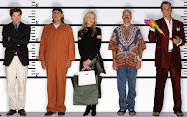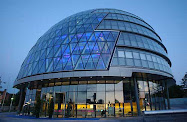Tropic Thunder: When a movie is so atrociously bad, where do you start?

This movie (if you would even call it that) is about five actors making a film about actual events that never happened. (Follow?) Tugg Speedman (Ben Stiller) is the token action star, Kirk Lazarus (Robert Downey Jr.) is a method actor with five Oscars under his belt, and Jeff Portnoy (Jack Black) is... the comedic actor whose sole function in the movie is to fart and have heroin withdrawals. Alpa Chino (Brandon T. Jackson), the stereotypical R&B artist who makes a drink called Booty Sweat, and Kevin Sandusky (Jay Baruchel), the awkward actor who's never be laid, round out the cast. Their director is played by Steve Coogan, who early on makes a reference that he is Jesus, which is probably a wink at his role in Hamlet 2. There are other people in the cast who have no real purpose even existing other than giving one-note performances, and there are unnecessary celebrity appearances (Lance Bass, Jennifer Love Hewitt, Christine Taylor). Tom Cruise appears in a "comedic" role that is supposedly going to restore our faith in him as a bankable actor, but I found it to be the most inane time-waster of the movie. When people say that Cruise's dance scene is hilarious, what they really mean is that Cruise bounces to hip-hop music and steals five minutes of your life that you'll never get back. In all honesty, the best part of the movie was Matthew McConaughey as Tugg Speedman's agent, and that really talks to how bad the rest was.
Now, I admit that I went into the movie with high hopes. The campaigning was quite clever and generated a lot of quick buzz for a movie that came out of nowhere. The trailer was filled with intelligent parodic lines, which lead me to believe that the movie was going to go beyond sophomoric anecdotes on racism and arrogant actors. But calling TT's humor sophomoric would be a compliment. All of the movie's best jokes -- from Robert Downey Jr.'s character quoting the theme song of The Jeffersons to Brandon Jackson's actual black actor responding, "What do you mean you people?" -- are in the trailer, and the rest of the movie is a bunch of scenes sewn together with music. There was no point to any of it. There was no intelligent commentary on the actors (other than a demand for TiVo in Vietnam). There was no moment of revelation. If you want to see how a parody is done, watch Hot Fuzz. TT is lacking in content, character development, and most importantly, jokes. I genuinely laughed twice. And both were in the first ten minutes of the movie.

Before the film even starts, fake trailers are shown. Tugg Speedman is in Scorcher and it's five sequels, holding babies in parkas at the top of a mountain of lava with overcompensating phallic machine guns. Jeff Portnoy is in a send-up of the Thanksgiving scene from The Nutty Professor, which was pretty much a 30 second spot of Jack Black dressed as multiple obese people farting. The only worthy trailer was for Kirk Lazarus in Satan's Alley, where he plays a monk having homosexual thoughts towards a surprise guest. (I won't spoil it because, seriously, it's worth the price of admission. But after seeing it, you have to leave the theater immediately before TT steals your soul.)
After the trailers, the movie goes downhill and loses its steam. At the half-way mark, I realized I wasn't laughing and that the film was highly offensive. In a previous post (Film News, August 2008), I mentioned the proposed boycott over the word "retard" and wondered if it was political correctness gone too far. The word is not the problem. It's Ben Stiller's mock performance as a mentally challenged boy ("Simple Jack") who can talk to animals that is offensive. It should have been mentioned once, but instead, it's a central part of the second act. In Laos/Vietnam, the heroin manufacturers (of course that's their job) only own one movie and it's Simple Jack so they make Tugg Speedman reenact the entire movie. It's offensive to the tenth degree. In fact, this movie is offensive to blacks, soldiers (and anyone we've ever fought in a war), and mentally retarded people. Surprisingly, it's not that offensive to women -- but how can it be when there are no women in the movie.
It's a frat comedy without the comedy. And to think that Tropic Thunder scribe Justin Theroux will be writing the sequel to Iron Man... it'll take me a few days to recover from this atrocity. In fact, I will pay you not to see this movie. Go rent Hot Fuzz instead.

Mama Mia!: The way that JD and I described this is movie is... it's a lackluster camp movie. Calling it campy would be overshooting. I have three major problems with this movie, all of which are expected because it's a direct stage-to-screen musical adaptation (meaning there is little added/subtracted from the original). One, the subpar singing. Two, the setting, choreography, and costumes were too stagy and didn't translate to the big screen. And three, the lack of substantial plot development/cohesion. But, on a positive note, I loved Amanda Seyfried (of Veronica Mars and Big Love fame).
Plot: Hmm. Stay with me here. Twenty year old Sophie (Seyfried) is getting married, so she invites three of her mother's past lovers who may or may not be her father to her wedding, including architect Sam (Pierce Brosnan), supposedly spontaneous Harry (Colin Firth) who doesn't do anything spontaneous, and casual up-for-anything Bill (Stellan Skarsgård). It doesn't take long for anyone to figure out how the movie ends. Also arriving are mother Donna's (Meryl Streep) backup singers Rosie (Julie Walters) and Tanya (Christine Baranski). Great music and cringe-worthy choreography collide in this farcical crisis of identity and personal desires.

1. The singing. I really don't understand why this is a hard concept for studio execs to understand. Big names don't bring people to musical movies, phenomenal singing does. Only a few people are die-hard-see-everything-she's-in Meryl Streep fans, but most people respect her as an actress because of the roles she chooses. I think everyone would agree that Miranda in Devil Wears Prada was an excellent light role for her to play. Streep cannot sing. She rarely hits the right notes, and when she does, it's only during the climaxes of her songs. Pierce Brosnan is literally laughable as a singer. Every time he sang, I had to hide my face in my shirt as not to bother the people around me because I was laughing uncontrollably. Christine Baranksi has a wonderful voice, as did Julie Walters, but she only sounded good when harmonizing with Baranski. Colin Firth had a mediocre song, but he sounded like Josh Groban in comparison with Brosnan. Even Dominic Cooper (The History Boys), who played the bridegroom, was disenchanting with a pathetic performance.
I've said it a thousand times: Hire singers for musicals. You can hide bad acting in the music. You can't hide bad music in the acting. When a movie is dominated by sound, that sound should be lovely and impressive and larger than life. It shouldn't sound like someone's singing in the shower without an audience. If the leads can sing well, the movie is a ten billion times between than having big names give subpar performances. Singers first, actors second.
2. The set, the choreography, and the costumes. During the credits, JD and I kept listing off all of the names who should've been fired. After a while, we got tired of naming everyone. First, the choreography reminded me of a high school production where there is limited space and limited imagination. The costumes -- other than Sophie's wedding dress and the bridesmaid dresses -- were uninspired and most likely picked off a used clothing rack. (Although, I must say, Colin Firth has some fine looking legs. A welcomed surprise.) But the set is what really bothered me. Just because the stage musical only has limited space and settings, it doesn't mean that a movie must limit its possibilities. There could have been more indoor scenes, or they could've moved some numbers in to town. The whole movie didn't have to take place in a courtyard, on a dock dock, and in two bedrooms. Tanya had an inappropriate and unappealing song on the beach next to a tiki bar that I swear was made from $5 worth of wood. Why couldn't this scene be in a veranda bar? Why did everything -- everything -- seem like it cost $5 to make? Why was imagination stifled and constricted? Example: During one song, Donna and Sam are "harmonizing" (or something close to it), but hey are visually separated by a rock wall. Why couldn't they do a split screen with the two of them in separate rooms? I kept thinking, "They can probably here the other one singing..."

3. The script. It's as if no one had seen the play and realized there are key plot points missing that won't translate to the screen without them, namely how the three potential fathers figure that they are the father or how (spoiler alert!) Donna would agree to marrying Sam after not having seen him for the past twenty or so years. (Spoiler alert!) If you were paying attention, you knew that Colin Firth's character would be gay -- but why did he just figure that out? Why is Sam divorced? Most importantly, why did the three men come to see Donna -- were they all still in love with her? And am I really supposed to believe that she still loves all three of them? The film needed snippets of added dialogue to connect the random songs together, but it just decided to ignore content in favor of slapstick light-heartedness. I love musicals -- more than you'd think -- so I wasn't expecting much from the movie, but you just can't put the stage production on the screen (unless you film it on the stage, like David Hasslehoff's Jekyll & Hyde production). The mediums are completely different and different rules are applied. As many musicals that get it right, there are just as many that fail horribly. (Speaking of horrible... Dr. Horrible's Sing-Along Blog got it right.)
But to end on a good note, Amanda Seyfried had the right combination of youth, confusion, hope, and spunkiness required for her role. Meryl Streep was ditzy rather than free, which it made it difficult for me to imagine her taking care of a hotel for the past decade(s). As much as they tried to differentiate the suitors, they were all exactly the same: nondescript. There isn't much to recommend beyond Seyfried. She saved me from dying of ridiculous boredom.









.jpg)


3 comments:
Cheers for the Hot Fuzz reference! That just made me moronically happy.
Thanks for the heads up, though. I was debating Tropic Thunder or Pineapple Express this weekend and I think you just helped me make my decision.
And as much as I love Abba (there! so unafraid to say it!), there is no way I would go see Mama Mia!, though kudos for The Hoff Jekyll & Hyde mention.
Though I do love Amanda Seyfried on Big Love.
Still not enough, though.
Okay. Done spamming your blog.
https://hollywood-spy.blogspot.com/2017/12/sun-kissed-abba-happy-mama-mia-here-we.html?showComment=1525852685719#c4819623420924633755
Post a Comment